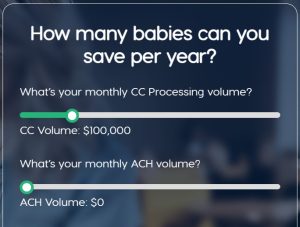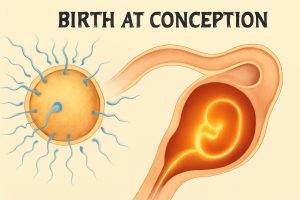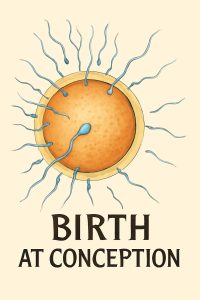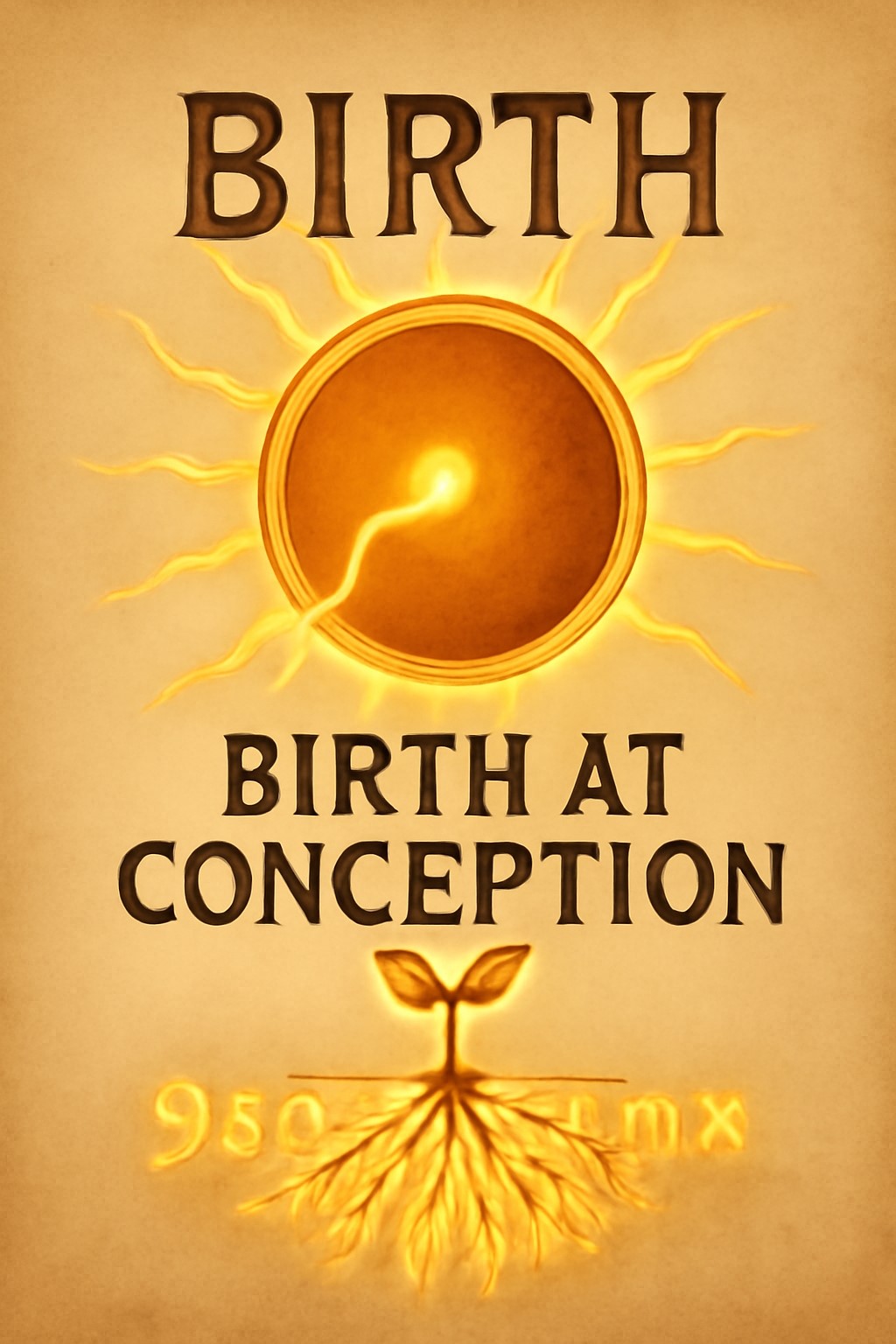All abortions are post-birth abortions
Pro Life Payments announced a groundbreaking proposal to reframe the national conversation on abortion and the beginning of human life. The organization is calling for a shift in language: from the traditional assertion that “life begins at conception” to the more definitive statement that “babies are born at conception.”
The concept that babies are born at conception represents a profound reframing of how we understand the beginning of human life. This article explores the philosophical, scientific, and legal foundations that justify using the term “born at conception” instead of simply stating that life begins at conception. While medical science clearly establishes that a unique human organism forms at fertilization, the linguistic and conceptual shift to describing this moment as a “birth” has significant implications for how we reason against abortion. All abortions are post-birth abortions. This perspective contrasts with the traditional notion of birth as delivery-the physical exit of the baby from the mother’s womb-and proposes a new understanding of birth – at conception.
How Many Babies Can You Effortlessly Save This Year?
 Take 30 Seconds to find out. Go to the Baby Saving Calculator at Pro Life Payments. Pro Life Payments is the for-profit arm of the pro-life movement. Pro-Life Payments is reducing abortion in America by turning customer financial transactions into pro-life funding. We give 15% of gross revenue to Pro-Life organizations. Payments is transitioning donation platforms, credit card processing and peer to peer payments into a funding engine for the pro-life community. Pro-Life Payments is providing customers with the alternative to the abortion-supporting financial institutions and payment processors they are supporting today.
Take 30 Seconds to find out. Go to the Baby Saving Calculator at Pro Life Payments. Pro Life Payments is the for-profit arm of the pro-life movement. Pro-Life Payments is reducing abortion in America by turning customer financial transactions into pro-life funding. We give 15% of gross revenue to Pro-Life organizations. Payments is transitioning donation platforms, credit card processing and peer to peer payments into a funding engine for the pro-life community. Pro-Life Payments is providing customers with the alternative to the abortion-supporting financial institutions and payment processors they are supporting today.
Redefining Birth: The Conceptual Foundation
 The term “birth” traditionally refers to the process of a baby exiting the mother’s womb-the delivery. However, examining the deeper meaning of what constitutes a “birth” reveals possibilities for more accurate application. Birth, in its essence, marks the beginning of a distinct existence-a coming into being. From this philosophical perspective, conception represents the first true birth of a human individual.
The term “birth” traditionally refers to the process of a baby exiting the mother’s womb-the delivery. However, examining the deeper meaning of what constitutes a “birth” reveals possibilities for more accurate application. Birth, in its essence, marks the beginning of a distinct existence-a coming into being. From this philosophical perspective, conception represents the first true birth of a human individual.
At conception, when sperm fertilizes an egg, a genetically unique human entity comes into existence for the first time. According to the American College of Pediatricians, “Every human embryologist, worldwide, states that the life of the new individual human being begins at fertilization (conception)”1. This moment marks the genesis of a genetically complete human being with a distinct genetic identity never before present in the world. If birth fundamentally means “coming into existence,” then conception represents the most fundamental birth moment.
The concept of being “born at conception” acknowledges that the most significant transition-from non-existence to existence-occurs at fertilization. This is not merely a semantic distinction but a recognition of the profound ontological shift that happens at this moment. When the zygote forms through the fusion of sperm and egg, a new human organism with its own unique genetic code and developmental trajectory comes into being.
Philosophical and Etymological Considerations
The word “birth” derives from Old Norse “byrðr” and Proto-Germanic “gaburthiz,” relating to “bearing” or “bringing forth.” While commonly associated with delivery from the womb, the deeper meaning encompasses the emergence of something new. Philosophically, this emergence happens most definitively at conception, when a genetically unique individual first exists.
This perspective allows us to reconsider what we mean by “birth” not merely as a physical passage but as the moment when an individual human life first manifests. At conception, the new human organism already possesses the complete genetic blueprint that will guide its entire life’s development. In this sense, conception represents the true “birth” of the individual’s unique existence, while delivery represents the transition into the external environment.
Scientific Foundation: The Beginning of Individual Human Life
 The scientific case for describing babies as being “born at conception” rests on the extensive biological evidence regarding when human life begins. According to medical science, conception marks the beginning of a new human life with distinct genetic identity and developmental continuity.
The scientific case for describing babies as being “born at conception” rests on the extensive biological evidence regarding when human life begins. According to medical science, conception marks the beginning of a new human life with distinct genetic identity and developmental continuity.
At fertilization, the sperm and egg fuse to create a zygote with a unique genetic composition. The Cleveland Clinic explains that during conception, “a sperm is successful on its quest to fertilize an egg, the now fertilized egg (called a zygote) continues to move down your fallopian tube, dividing into two cells, then four cells, then more cells”. This new organism is genetically distinct from both parents, with its own individual DNA sequence that will remain unchanged throughout life.
Scientific consensus broadly supports the view that human life begins at conception. A study cited in search result found that “the fertilization view was the most popular perspective held by public health and IVF professionals.” From a purely biological perspective, conception marks the beginning of a continuous developmental process of a unique human organism.
The Creation Museum states this plainly: “Life begins at fertilization, when the chromosomes from the sperm and the egg combine, forming a genetically unique individual”. From this scientific foundation, referring to babies as being “born at conception” accurately captures the moment when their individual biological existence begins.
Developmental Continuity
An important scientific consideration supporting the “born at conception” framework is the principle of developmental continuity. From zygote to blastocyst to embryo to fetus to newborn, there is no point at which the developing human becomes “more human” in a biological sense. As noted in search result, “The biological line of existence of each individual, without exception begins precisely when fertilization of the egg is successful.”
The zygote formed at conception is not merely a potential human but already a human being at the earliest stage of development. As Paul Scherz, associate professor of moral theology/ethics who holds doctorates in both genetics and theology, explains: “Once you study the science of embryology, you see the human organism really begins at the moment of conception…It is one continuous process of development”.
Legal and Historical Perspectives for Birth at Conception
The concept that babies are born at conception finds support in various legal frameworks and historical precedents around the world. Multiple countries have constitutional protections that explicitly recognize life or personhood from the moment of conception.
According to search result, several countries including Chile, the Dominican Republic, Ecuador, El Salvador, Guatemala, Hungary, Honduras, Madagascar, Peru, the Philippines, and Slovakia all have constitutional provisions protecting human life from conception. For instance, El Salvador’s constitution recognizes “as a human person every human being since the moment of conception”.
In the United States, Representative Eric Burlison introduced the Life at Conception Act in February 2025, which seeks “to affirm the fundamental right to life for every human being, born and unborn” and declares “that unborn children are ‘persons’ under the 14th Amendment to the United States Constitution”. This proposed legislation demonstrates ongoing efforts to legally recognize personhood from conception.
Historical perspectives also offer precedent for this view. In 1869, Pope Pius IX established the Catholic teaching that “the soul is born at conception”, providing religious grounding for the concept of being “born at conception” that has influenced thought for over 150 years.
Terminological Distinction: Conception Birth vs. Delivery
To clarify the distinction between birth at conception and delivery while maintaining the “born at conception” framework, we can consider a model of birth – delivery in human development: conception birth and delivery. Both represent crucial transitions in human existence.
Christian Merchant Card Processing
Pro Life Payments is the for-profit arm of the pro-life movement. Pro-Life Payments is reducing abortion in America by turning customer financial transactions into pro-life funding. We give 15% of gross revenue to Pro-Life organizations. Payments is transitioning donation platforms, credit card processing and peer to peer payments into a funding engine for the pro-life community. Pro-Life Payments is providing customers with the alternative to the abortion-supporting financial institutions and payment processors they are supporting today.
Birth at Conception
Conception birth marks the beginning of a unique human life. At this moment, a genetically distinct individual with their own developmental trajectory comes into existence. As the Cleveland Clinic explains, after fertilization “the zygote has traveled to your uterus. It’s now a growing cluster of about 100 cells called a blastocyst”. This birth establishes the biological identity of the individual.
Delivery
In contrast, delivery refers to the process traditionally known simply as “birth”-when the baby exits the mother’s womb to begin life outside the maternal body. Medical literature describes this process in detail: “Childbirth, also known as labour, parturition and delivery, is the completion of pregnancy where one or more babies exits the internal environment of the mother via vaginal delivery or caesarean section”.
RxList defines labor as “the process of delivering a baby and the placenta, membranes, and umbilical cord from the uterus to the vagina to the outside world”. This delivery represents the transition from prenatal to postnatal life.
The distinction between birth at conception and delivery maintains the integrity of the “born at conception” concept while acknowledging the significant transition that occurs at delivery. Both moments represent critical thresholds in human development-the first establishing existence itself, the second establishing independent biological functioning in the external world.
Conclusion: The Birth – Distinction
The concept that babies are born at conception offers a meaningful framework for understanding human development. While new in terminology, it accurately captures the profound moment when a unique human life begins. This perspective is supported by scientific understanding of human development, legal precedents in various jurisdictions, and philosophical considerations about what it means to come into being.
By adopting a Birth – Delivery distinction-recognizing conception birth as the beginning of unique human existence and delivery as the transition to external life-we can better articulate the continuous nature of human development. This framework acknowledges that while delivery represents a dramatic change in environment and functioning, the essential identity of the individual has existed since conception.
The phrase “babies are born at conception” thus serves as more than mere semantics-it represents a conceptual reframing that highlights the continuity and dignity of human life from its earliest moments. While this perspective has particular resonance with certain religious and philosophical traditions, it is ultimately grounded in the biological reality that human life begins at fertilization, when a genetically distinct individual first comes into existence.
References
When Human Life Begins – American College of Pediatricians
Conception: Fertilization, Process & When It Happens – Cleveland Clinic
Conception: What to know – Medical News Today
Implications of Defining When a Woman Is Pregnant – Guttmacher Institute
For the “Life Begins at Conception” Crowd, Why Don’t… – Reddit
Life Begins at Conception? That’s Not Point Zero – Rewire News Group
Congressman Burlison Introduces Life at Conception Act
Childbirth – MedlinePlus
Childbirth – Wikipedia
Prenatal Rights – Wikipedia
When does human life begin? The scientific evidence and terminology revisited – PubMed
Masters of the Uterus – Mother Jones
Labor (Childbirth) Definition – RxList
When Does Life Begin? – Creation Museum
AZ House Judiciary Committee Passes Bill – KJZZ
University Experts Weigh When Life Begins – Catholic University
A Jewish Woman’s Perspective on Abortion – Ilana Wiles
The Beginning of Human Life – PMC
Personhood at Conception: A Scientific and Legal Analysis – Seton Hall Law Review
Original Meaning – Effington Eastman
Beginning of Human Personhood – Wikipedia
Human Fertilization – Wikipedia
What Does Conception Mean? – Healthline
Conception – Taber’s Medical Dictionary
When Does Life Begin? – NPR
40 Quotes from Medical Experts That Prove Human Life Begins at Conception – Live Action
Conception Definition – RxList
A Scientific View of When Life Begins – Charlotte Lozier Institute
Conception: How it Works – UCSF Health
Conception – Wikipedia
Life Doesn’t Begin at Conception – Reddit
When does human life begin? – Fertility and Sterility
When Does Personhood Begin? – SciJust UCSC
Alaska Legislature Document
CMV: Life Begins at Conception is Just As… – Reddit
The Conception Conundrum – Human Life International
How to Prove Life Begins at Conception – Catholic Answers
The Beginning of Human Life – PMC
When is the Foetus Alive? – BBC Ethics
CMV: Life Begins at Conception Sounds Like a Good… – Reddit
When Does a Human Person Begin? – Christian Courier
The Biological Beginning of Human Life – PMC
Why Life Doesn’t Begin at Conception – Times Union
Parturition – BYJU’S
Difference Between Delivery and Labour – Top Doctors UK
Medical Terms and Definitions During Pregnancy and Birth – Better Health Channel
Parturition Definition – RxList
Labor and Delivery – Cleveland Clinic
Childbirth Problems – MedlinePlus
Parturition: What to Know – Healthline
Labor and Delivery – NICHD
Parturition Definition – Dictionary.com
Stages of Labor – Mayo Clinic
Birth and Labor Terms and Definitions – Purdue Extension
Birth and Labor Terms and Definitions – Harris County
The Beginning of Human Life – PMC
S.99 – Life at Conception Act – Congress.gov
Legal Personhood at Conception – Marquette Law Review
Legal Consequences of the Fetal Personhood Movement – Cornell Law
HJR 18 Fact Sheet – Planned Parenthood Action
When Human Life Begins – American College of Pediatricians
H.R.431 – Life at Conception Act – Congress.gov
A Closer Look at State Personhood Laws – Washington Post
Congressman Burlison Introduces Life at Conception Act
Birth – Britannica
Labor – Johns Hopkins Medicine
Labor and Delivery Factsheet – NICHD
Labor & Delivery: Giving Birth – Colorado Women’s Health
Labor and Delivery Overview – Medscape
The Personhood Movement Timeline – ProPublica
Legal Fetal Personhood Timeline – Legal Voice
Fetal Personhood and Abortion Rights – MSNBC
Personhood Amendment Advances in Montana – Montana Free Press
Fears Personhood Amendment Come True – Legal Momentum
Life Begins at Conception – Stand for Life
Abortion Opponents Push for Fetal Personhood Laws – NPR
